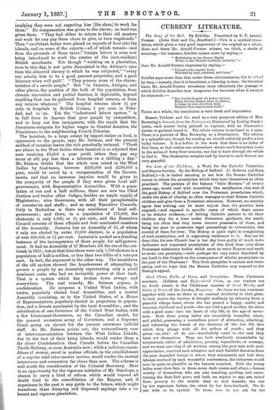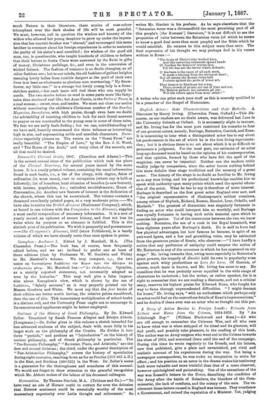Good Cheer, Paths of Peace, and Snowflakes. Three Christmas numbers.
(Isbister and Co.)—Good Cheer, as our readers are no doubt aware, is the Christmas number of Good Words, and Paths of Peace of the Sunday Magazine. On these we can comment together with ease, as there is an unusual similarity in their plots. In both stories the heroine is brought suddenly by calamity from a peaceful village home, where she has passed a happy, useful, and innocent childhood and youth—the one with a good mother, the other with a good aunt—into the heart of city life, at the age of seven- teen. Both these young ladies are exquisitely beautiful, sweet, and pitiful, possessing a marvellous power of attracting, attacking, and reforming the lowest of the denizens of the low life into which they plunge with all the ardour of youth ; and they prove—as, alas ! all do not—wonderfully equal to the task they have set themselves. They are both absolutely unassailable by temptations, either of admiration, poverty, ingratitude, or revenge, and we must own that if all workers among the poor met with such appreciation, received such adoration and such faithful devotion from the poor degraded beings to whom they ministered, and had their labours crowned by such wonderful conversions, the labourers would soon be quite as plentiful as the harvest required. Both the young ladies meet their fate in these same dark courts and alleys,—heroes worthy of themselves, who are also teaching, guiding, and enter- taining the East-End poor; and both, we rejoice to say, are raised from poverty to the wealth they eo well deserve, the one by her repentant father, the other by her hero-husband. We do not wish to be cynical. To those who do not ask for too
much Nature in their literature, these stories of rose-colour triumphant over the dark shades of life will be most grateful. We must, however, call in question the wisdom and honesty of the widow who allowed her young daughter to grow np under the impres- sion that her convict-brother was "abroad," and encouraged this same brother to romance about his foreign experiences in order to maintain
the purity of his sister's soul unsullied ; the wisdom of the good old man, too, is questionable, who taught hundreds of children to believe that their letters to Santa Clans were answered by the Saint in gifts of money, Christmas puddings, &c., and even in the conversion of wicked fathers. The fashion of romance is no doubt changing, as all other fashions are ; but to our minds, the old fashions of gallant knights rescuing lovely ladies from terrible dangers at the peril of their own lives is at least as wholesome as glorious men murmuring, " My Snow- flower, my little one !" to a strange but lovely young lady in a fever- stricken garret,—but each taste will find those who can supply its needs. The two stories before us read in some parts more like fairy- tales than stories of real life ; but Aunt Carrie, in the Paths of Peace, is a real woman,— sweet, tree, and tender. We must not close our notice without mentioning the children's Christmas number of the Sunday Magazine, Snowflakes, with high praise, though even here we doubt the advisability of teaching children to look for such literal answers to prayer as are vouchsafed to the young ones in some of these tales. We fear we are sadly fault-finding ; but we can, notwithstanding all we have said, heartily recommend the three volumes as interesting, high in aim, and representing noble and unselfish characters. Snow- flakes especially pleases ns. The verses on the " Great Frost" are really beautiful. "The Empire of Love," by the Rev. J. G. Wood, and "The Horse of the Arab," and many other of the morsels, are all that could be desired.















































 Previous page
Previous page